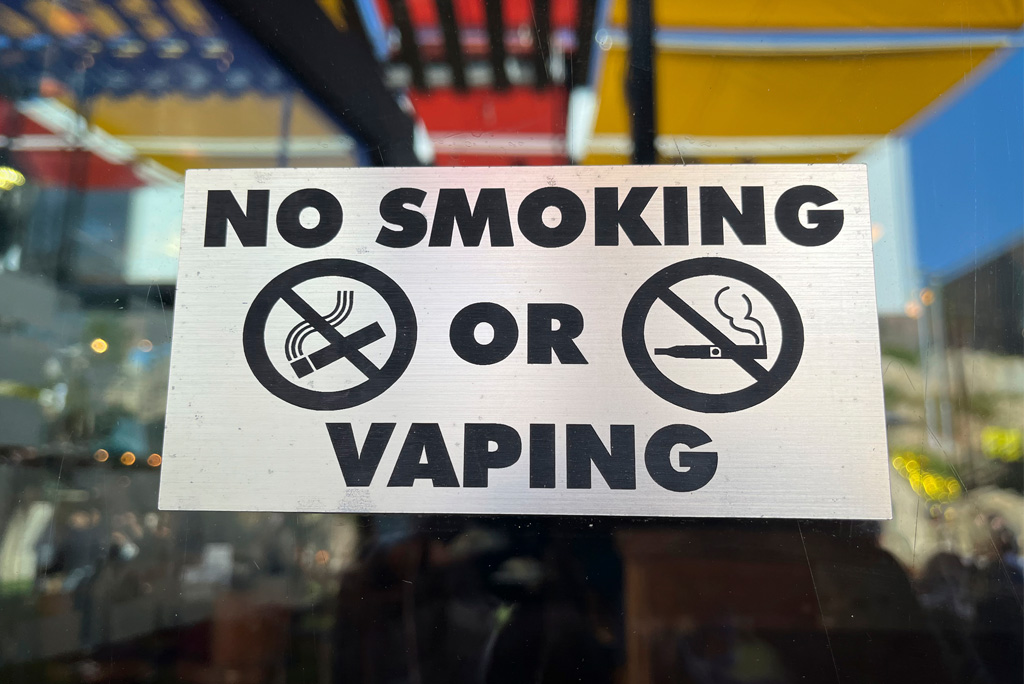BANGKOK – Anti-vaping advocates have raised concerns about the growing number of young people using e-cigarettes in Thailand. Following a survey by the Department of Health Service Support (DHSS), ThaiHealth is now pushing for stricter policies and tougher penalties, saying that existing measures are not enough to protect children from nicotine addiction.
The survey showed that even very young children, with the youngest reported user aged six, are getting drawn into vaping. ThaiHealth believes this highlights a need for tighter law enforcement and more action to protect young people.
The national survey by DHSS, published in 2024, shows a sharp increase in vaping among Thai youth. Out of 61,688 young people surveyed, 9.1% said they currently use e-cigarettes. Most said their friends influenced their decision, and almost all thought vaping was harmless.
The problem has grown fastest among teenagers between 13 and 15, with usage rising from 3.35% in 2015 to 17.6% in 2022. News of a six-year-old vaping has shocked many, making clear just how far e-cigarette use has spread among children.
Social influence and aggressive marketing are making things worse. Many teenagers say they learn about vaping from friends, who describe it as cool or harmless. Dr Chanetnan Kittithorn, who recently graduated from Mahidol University, says vaping is now openly accepted among teens. “I see my friends using e-cigarettes at the dinner table or in cars.
No one tries to hide it because it’s become a normal thing,” he shared. Young people like Katatee Kookchai, aged 16, have pointed out that marketing for these products often targets youth directly. He added, “The branding is aimed at us and makes vaping seem tempting, which leads to addiction.”

Health Dangers Linked to Vaping
Health experts warn that e-cigarettes carry serious risks, especially for children and teenagers. Nicotine found in vaping products can harm brain development, lower concentration, and affect learning and behaviour.
The National Human Rights Commission of Thailand (NHRC) wrote to the prime minister to highlight these risks, saying that nicotine endangers both cognitive and behavioural growth in young people. E-cigarettes are also linked to cancer, lung illnesses, poisoning, and instant nicotine overdose from inhaling.
Research from Ramathibodi Hospital in 2024 estimates that vaping-related illnesses cost Thailand around 306 million baht (about 8 million euros) last year. Some of these health cases were caused by the use of unregulated substances like cannabis oil in vapes, leading to lung inflammation and other problems.
The World Health Organization (WHO) has called vaping unhealthy and addictive for young users. Dr Jos Vandelaer, the WHO Representative to Thailand, has urged joint action. “The tobacco industry uses subtle tactics to lure young people. We must inform them of these dangers and make our policies stronger so these companies cannot affect our health systems,” Dr Vandelaer said.

Vape Products Widely Available
Despite Thailand’s ban on e-cigarettes under the Customs Act and Tobacco Products Control Act, vaping products are still widely available. Experts say the illegal vapour market is valued between 3 and 6 billion baht, fuelled by smuggled imports and local production.
Disposable vapes, often brought in from China, are sold openly in cities like Bangkok, Pattaya, and Phuket, as well as through online channels and social media. These unregulated products raise concerns about quality and safety.
Recently, in March 2025, customs seized more than 200,000 smuggled e-cigarettes worth 33 million baht at a port, part of nearly 300 shipments stopped since October 2024.
Between late February and early March 2025, 690 people were arrested in 666 vape-related cases, and almost 455,000 vaping items (worth over 41 million baht) were confiscated. To fight the online trade, the Digital Economy and Society Ministry blocked 9,515 URLs linked to illegal sales between March 2024 and March 2025.

Vaping Products Marketed to Children
A big area of concern is how e-cigarette companies target children. Products called “toy pods” are shaped like cartoon characters, such as Doraemon, and are meant to attract school and university students.
These devices come in bright colours, offer sweet flavours, and are available in more than 16,000 varieties. The marketing uses claims that mislead buyers about safety, heightening risk and making these products attractive to younger users. Health groups warn that a lack of control in the black market means these products reach children with no age checks.
Thai authorities have stepped up efforts against illegal vapes. Police in Chiang Rai have closed down shops selling banned products, as part of a nationwide campaign launched by Prime Minister Paetongtarn Shinawatra in 2025. This has reduced e-cigarette sales and use by an estimated 80%. The government has also introduced a reward scheme on the Thang Rath mobile app so people can report illegal activity and get up to 60% of the fines collected.
Enforcement, however, varies. While simply owning a vape does not break the law, users can still be prosecuted under contraband rules, facing up to five years in prison or fines worth four times the product’s price. Importers and sellers face even higher penalties, with jail terms up to 10 years or fines equal to five times the illegal goods’ value.

ThaiHealth’s Push for Change
The Thai Health Promotion Foundation, working with the NHRC and WHO, is urging the government to revise the Tobacco Products Control Act to include all e-cigarettes and new tobacco products.
The group wants more public education to dispel myths about vaping safety and calls for e-cigarette lessons in schools. ThaiHealth also seeks stricter controls over imports, sales, and social media promotions aimed at young people.
A spokesperson for ThaiHealth stated, “We must not let the tobacco industry take advantage of our children. Stronger laws are needed to protect the next generation.”
With these challenges, Thailand faces a pressing need to strengthen its vaping ban. Tackling the illegal market, clamping down on youth-focused marketing, and increasing public awareness can help lower e-cigarette use among young people and protect them from long-term harm.














